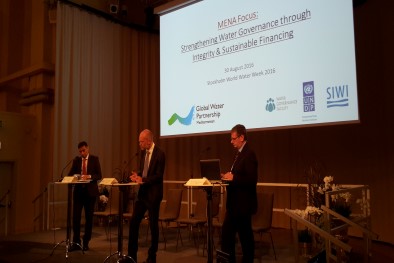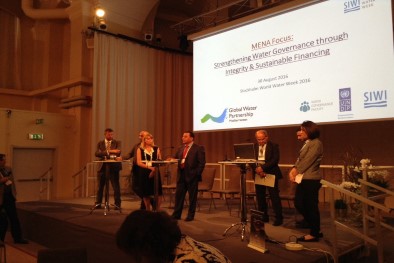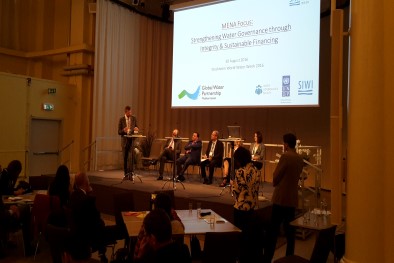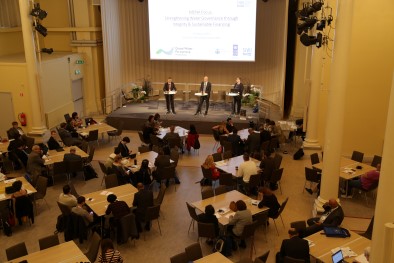The 2nd “MENA Focus” session was co-convened by GWP-Med and the United Nations Development Programme – Stockholm International Water Institute Water Governance Facility (UNDP-SIWI WGF).
It focused on the crucial role of water governance and how it can be reinforced through integrity and sustainable financing, benefitting from the work of two Swedish International Development Cooperation Agency (Sida)-supported, Union for the Mediterranean (UfM)-labelled regional projects: “Governance & Financing for the Mediterranean Water Sector” and “Water Integrity Capacity Building for the MENA Region”.

Mr. Anders Frankenberg, Head of MENA Department at Sida, and Mr. Almotaz Abadi, Managing Director, Water and Environment Division, at the Union for the Mediterranean, opened the event, representing the institutional partners of the two regional projects. The facilitator of the opening segment, Mr. Vangelis Constantianos, GWP-Med Executive Secretary, highlighted the value of the partnership established bringing together towards common goals the beneficiary countries, the enabling regional institutions, the stakeholders, and the donors. ”There is no other way forward, than through a functional partnership”, he noted.
The panel discussion that followed was facilitated by Ms. Anthi Brouma, Head of the MENA Region at GWP-Med, and Mr. James Leten, Programme Manager, Water Integrity Capacity Building Programme at the UNDP-SIWI WGF.

Ms. Rawan Isseed, Head of Project Implementation Unit, Reform Programme (Palestine), identified the occupation of Palestine and the destruction of infrastructure as principal reasons for water insufficiency and obstacles to development.
Mr. Ali Subah, Secretary General Assistant for Strategic Planning, at the Jordanian Ministry of Water and Irrigation, said that “public participation, especially through the involvement of farmers and other users in decision making, is characteristic of the Jordanian approach”.
Mr. Ridha Gabouj, General Director of Rural Engineering and Water Management, at the Tunisian Ministry of Agriculture, Water Resources and Fisheries, noted that “the private sector has an important role to play and that beyond political willingness, the field needs to be prepared through the formulation of strategies and the engagement of stakeholders”.

Ms. Anja Taarup Nordlund, Gender Expert, noted that “although good papers and guidelines exist, strategies do not take into account gender perspectives and needs”. She called for ministries to hear women’s voices and companies to involve women in decision making, something that has been demonstrated to lead to better overall performance.
Mr. Mufleh Al Abbadi, Programme Manager, Water & Climate Change Programme, at the International Union for Conservation of Nature – Regional Office for West Asia (IUCN ROWA) stressed that “integrity is an issue further to technical ones and that there is a need to build stakeholders’ capacities to participate beyond consultations”.
Mr. Christian Severin, Senior Environmental Specialist at the Global Environment Facility (GEF), stressed that “data and strong implementing partners are required for successful interventions” and reconfirmed the commitment of GEF to continue funding much-needed investments at global and regional scale.
Following discussion of the panel members with the audience, the two panel facilitators then offered insights from ongoing work, sharing key findings from the two Sida-supported, UfM-labelled regional projects, “Governance & Financing for the Mediterranean Water Sector” implemented by GWP-Med and the Organisation for Economic Cooperation and Development (OECD), and “Water Integrity for the MENA” implemented by the UNDP-SIWI WGF. Sida supported the event through the two projects.
